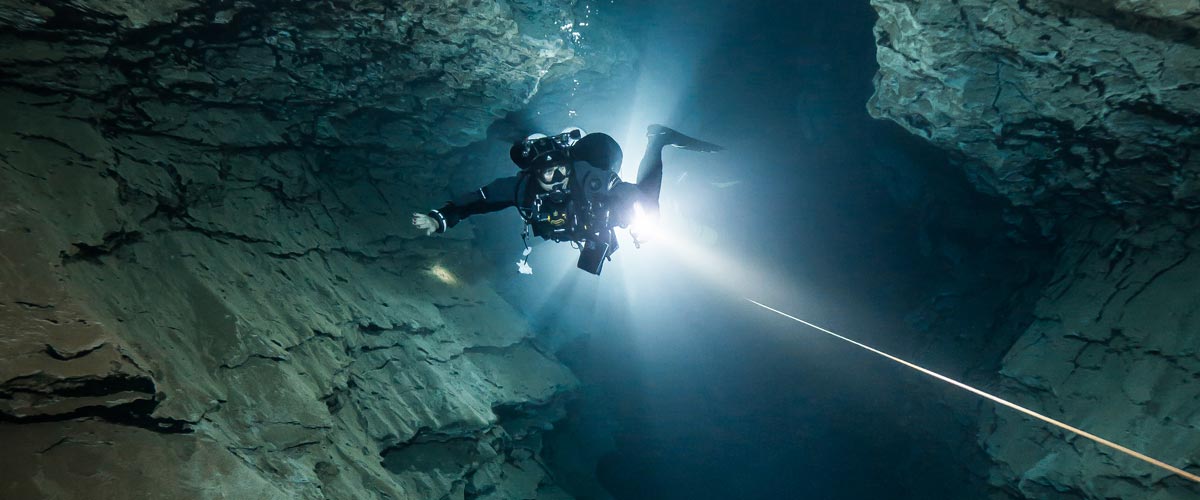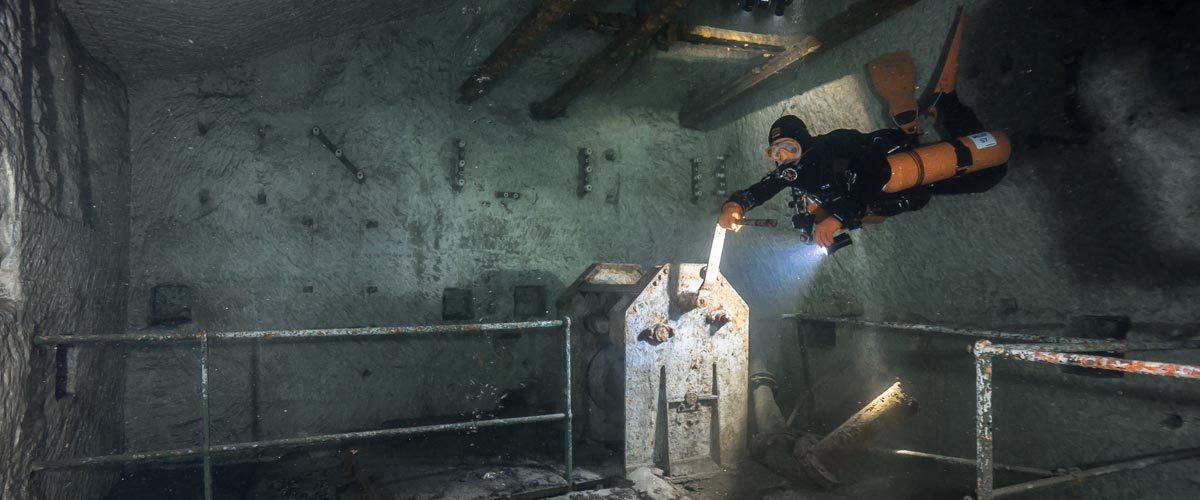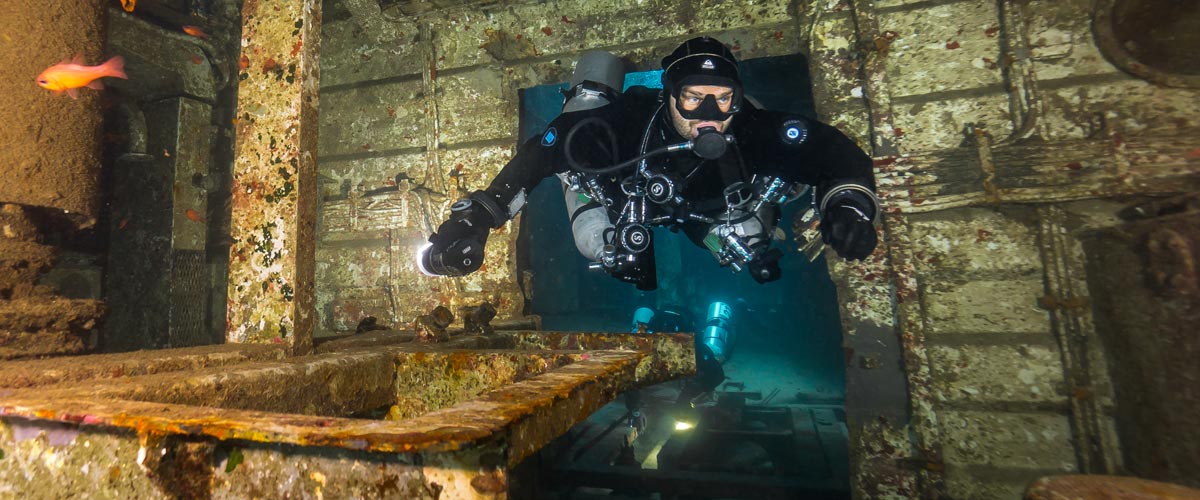Dive Training Blogs
Jump into… Divemaster Training

The tank carrier, the equipment holder and finder… the credentials on the CV of a good Divemaster?… Only joking… and I actually am. In honesty, this is one of my biggest bugbears. Divemasters being used as the person to do all of the odd jobs that nobody wants to do, as a ‘learning’ experience, with the excuse that ‘we have all been there’ as if it is a right of passage.
The Divemaster course should be fun. After all to continue the succession of diving, we need new divers. To get new divers, we need new instructors. To get new instructors, we need Divemasters to enjoy what they do and want to progress. It’s the circle of diving!
How was your Divemaster course? Can you relate to this… I know I can. Being the person in 2 degree water before anyone else in the middle of winter, helping the student divers kit up, before the instructor came in after finishing a hot chocolate. A factor to once again prevent divers from wanting to take their Divemaster course here in the UK and head abroad for it, after all carrying tanks in the sun whilst getting a tan sounds a lot more appealing in itself.
The Divemaster course is one of my favourite PADI pro courses to teach. The excitement that divers have taken their first steps of the pro ladder. Ready to put their passion towards teaching the next generation of divers. Watching the pride on a persons face when they have passed and taken out their first group on a guided dive, enjoyed by all… priceless.
There may be many of you devastated that your diving career was put on hold due to Covid, as your Divemaster internship has been cancelled abroad, but the UK has so much to offer too, and it’s not all sitting in lectures and diving in no visibility in freezing cold water. I can only speak about our own Divemaster course held here at Vivian, but I am sure many other UK centres will offer similar…. Just not better (only messing, love you all!)
Just like abroad, our Divemaster courses involve assisting on courses, having a 5 star IDC centre will likely allow more exposure to different courses, as more of them will be taught there. In turn meaning that you experience different skills and teaching techniques. There is experience assisting on shore and boat dives, learning briefing, navigation and dive planning techniques… I mean, doing the Divemaster course has to be a good choice just for this reason… free dives out to explore the UK coastline as part of your course… who wouldn’t want to do that! And then there is the theory, which can now be completed online, giving you the opportunity to learn whilst you are working from home during lockdown. So if becoming a Divemaster was on the cards in 2020 and 2021 and was put on hold. Maybe consider the UK as your Divemaster location for 2022!
Clare began Duttons Divers at just 19 years old and a short while later became one of the world’s youngest PADI Course Directors. Find out more at www.duttonsdivers.com
Blogs
Intro to Tech: What is it about?
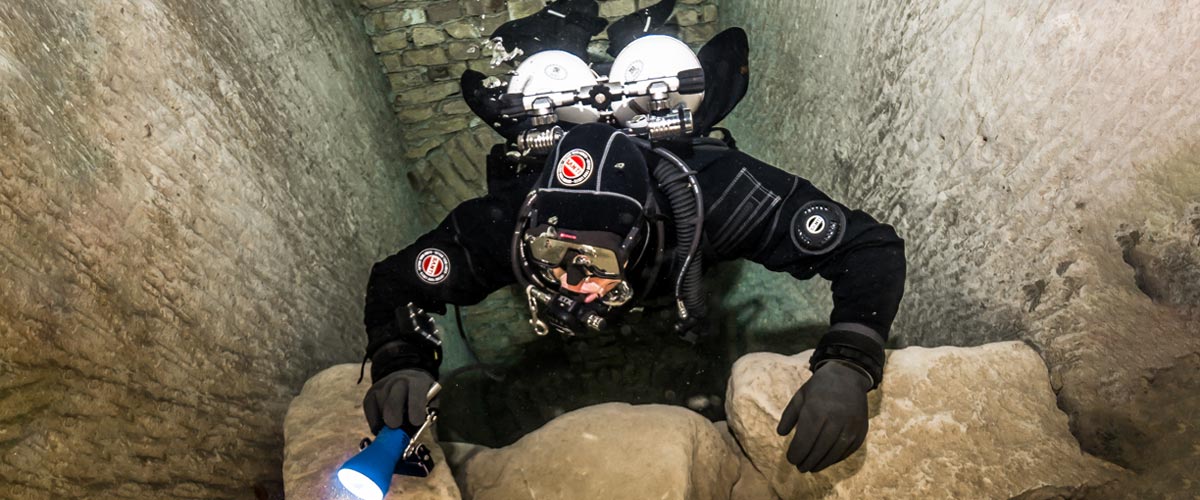
Article by José Pablo Mir
Pictures by Cezary Abramowski
The world of technical diving is exciting. It opens the door to new sites, depths, and bottom times. More importantly, it opens our minds to a new way of planning, facing, and experiencing dives, even those not purely technical.
Becoming a technical diver is a process, and like in other aspects of life, we should find the proper entry point that suits us best based on our knowledge and experience. The Introduction to Technical Diving course from TDI -the world’s largest and most recognized technical diving teaching organization- is the best option for divers who have yet to gain experience in the fundamental aspects of this new practice. The course’s content and its embrace of new techniques and technologies make it possible to acquire a solid foundation to learn and gain experience in this practice properly.
Becoming a technical diver is not something that happens overnight, whether deciding to become one or receiving a certification card stating we are now technical divers. It is a slow process extending farther away than any introductory course. It requires effort and dedication. But it will bring us satisfaction from day one -or two.
It is a matter of mentality
First, we must understand and accept that technical diving, involving greater depths, longer bottom times, exotic gases, virtual or real ceilings, and more, comes with higher levels of risk than the sport diving we have been practicing until now.
Although this discussion usually starts with a warning about risks, as I’ve done in the previous sentence, our practice is not a game of chance.
Technical diving is a rational activity that requires maturity and good judgment, and we will put everything into ensuring that each dive is a successful one -meaning we return from it safe and sound. With this understanding, we will strive to establish a mental attitude more aligned with our practice and its realities.
This new “technical diver” mindset we will develop will lead us to be more cautious in our executions, more analytical in our plans, more rational in our strategies, and more detailed in our procedures.
Experience will keep teaching us to know ourselves better, to keep our anxiety and other emotions under control, and to manage our impulses. Over time, our senses will sharpen, and we will be more attentive to the particulars of the situation we find ourselves in.
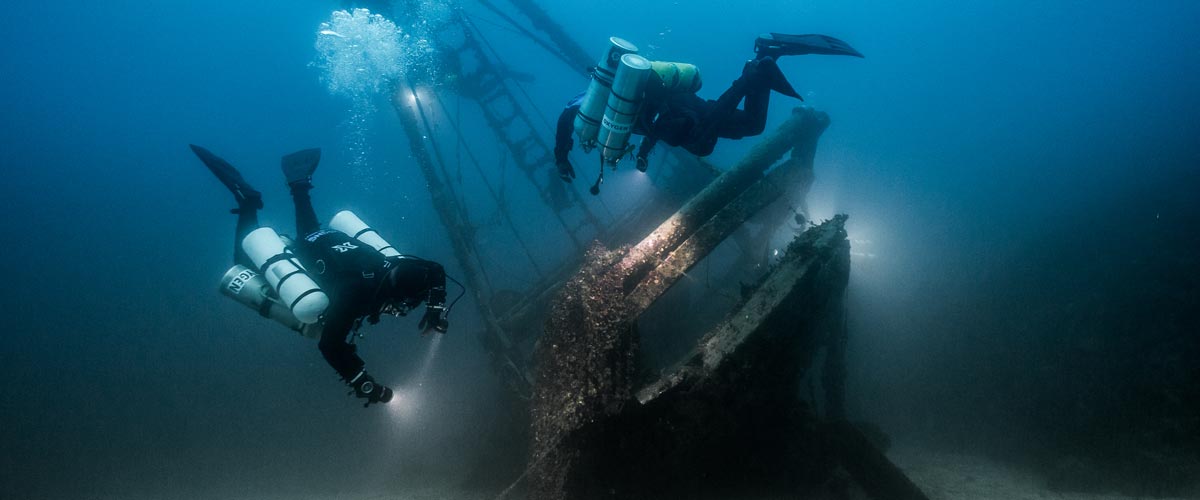
Strategies and procedures
Our strategies, those broad guiding lines tracing the path to follow, from how to approach planning to where, with what, and how we are willing to get there, will be more specific and more practical. Not because they magically become so, but because we will consciously and deliberately frame them that way.
We will establish clear, concise, and realistic procedures. Not only for the undesirable situations that may present themselves but also for those that are part of our dive objectives.
Even though, as technical divers, we often use equipment different from what we were previously accustomed to, it is essential to note that the gear does not make the diver. In a way, we could consider such equipment as the necessary tools to implement what our goal seeks to achieve, according to our strategies and procedures.
Technique plays an important role
We must put our greatest effort into learning and perfecting the different techniques we will be acquiring. Buoyancy, trim, propulsion, cylinder handling, deploying DSMBs and lift bags, valve drills, and more are essential skills we must begin to master to progress in our art. What we cannot do, when we need to do it, can harm us.
Our techniques must be effective and achieve the purpose for which they were devised. But they must also be efficient and require the least resources possible, including the time they take and the effort they demand. Effectiveness and efficiency will prevail over beauty and other considerations that may come to mind, although none of them should be mutually exclusive. A technique executed efficiently and effectively tends to have an inherent beauty.
Refining techniques is a lifelong mission. Some of them will be easy to master from the go; others, on the other hand, will be our life mission and will require many repetitions just to resemble the idea we have in mind of how they should be executed.
We must consider the environment
Our learning, the needs and musts of the practice we engage in, the experience we gradually gain, our strategies and procedures, and even our equipment and tools change with the environment.
Diving in the ocean, everything about us must be suitable for ocean dives. Conditions there rarely emulate those found in a pool, lake, or river. Variable winds and currents, greater depths, visibility conditions, other divers with uncertain skills around us, marine life, maritime traffic, distance from the coast, and many other factors add complexity and uncertainty.
It is never necessary to master the pool on the first day, but planning and aspiring to gradually cope with the ocean’s conditions is essential.
The cost of good training
We are aware that our resources are often scarce in relation to the possibilities of use we could give them if they were not. To a greater or lesser extent, we are part of the economic reality in which we are embedded.
Fortunately, the cost of good technical diver training is not an entry barrier. Comparing training and equipment costs, we see that the former are generally lower. Yes, lower cost for personalized service, essential to our future
performance and safety, than for a series of mass-produced products that are mere, albeit necessary, tools for an end.
The value of good training
The value of the training we received encompasses a range of characteristics, from emotional and methodological to technical and technological. TDI and its Introduction to Technical Diving course offer a deep and modern approach, with a teaching strategy that aims to create thinking divers, not merely obedient ones.
As technical divers, our knowledge is our primary tool. In this type of activity, what we don’t know can harm us.
Is this course optional?
Unfortunately, the fact that this Introduction to Technical Diving course is not a prerequisite for any subsequent training is an invitation to consider it optional. And we all know what usually happens to “optional” under budget constraints.
However, this course should be seen as optional only by those divers who are somehow familiar with the use of technical equipment, who have a mindset more in line with the requirements of this type of diving, who plan and execute the dives the proper “technical” way, who know their gas consumption rate, who are not intimidated by non-decompression tables, who feel comfortable using their dive computers, and know the techniques and have at least an acceptable level of buoyancy, positioning, and propulsion. Those can go straight to a more advanced training course, such as TDI’s Advanced Nitrox.
We must ask ourselves whether or not we are in that group.
Remember our goal: to have fun
Recreational diving is our passion. Jumping into the water carrying heavy equipment and having properly dotted our I’s and crossed our T’s have only one ultimate goal: fun. This is the activity we have chosen as a hobby. We must enjoy it; it must give us pleasure and make us vibrate.
Having a good time is not optional!
Blogs
Four opportunities to go pro in 2024 with Dive Friends Bonaire
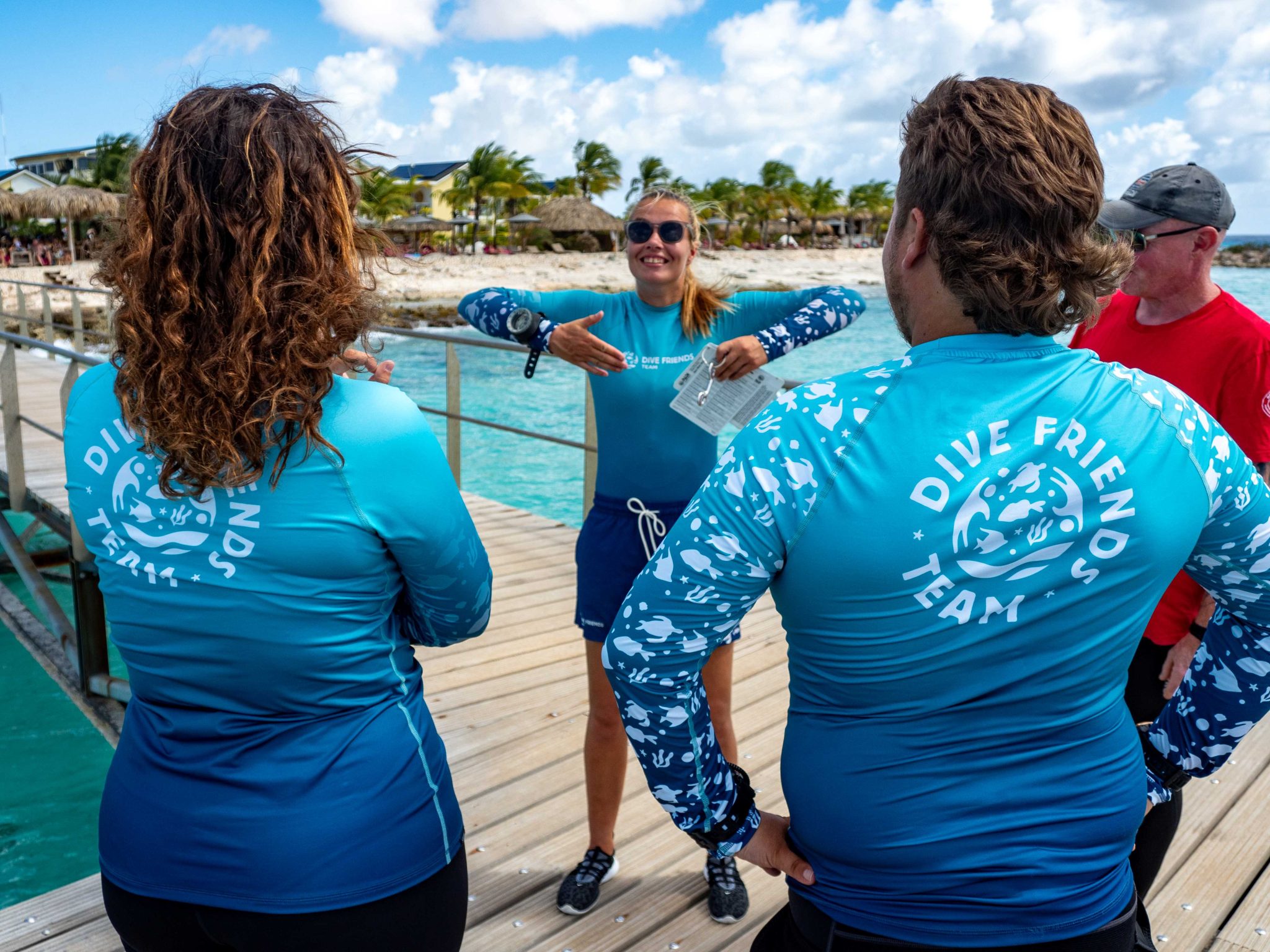
Dive Friends teaches the Instructor Development Course (IDC) several times a year to students who are eager to share their passion for diving with the world.
Dive Friends is known for the personal approach throughout the course. Their in-house course director will lead the students through every essential step, mentoring them to achieve their fullest potential as a dive instructor.
Applications for the following IDC start dates are now open:
- 12 April
- 5 July,
- 20 September
- 29 November
Partnership with Casita Palma
If the student opts for the IDC-Deluxe or IDC-Supreme package, their accommodation will be arranged for them at Casita Palma. This small and quiet resort is within walking distance from Dive Friends Bonaire’s main dive shop location and has everything you need to relax after an intense day of IDC training. Breakfast is included, so the student will always be fuelled and ready for their day.
Contact Dive Friends Bonaire’s Course Director Eddy for more information: coursedirector@divefriendsbonaire.com.
-

 News3 months ago
News3 months agoHone your underwater photography skills with Alphamarine Photography at Red Sea Diving Safari in March
-

 News3 months ago
News3 months agoCapturing Critters in Lembeh Underwater Photography Workshop 2024: Event Roundup
-

 Marine Life & Conservation Blogs2 months ago
Marine Life & Conservation Blogs2 months agoCreature Feature: Swell Sharks
-

 Blogs2 months ago
Blogs2 months agoMurex Resorts: Passport to Paradise!
-

 Blogs2 months ago
Blogs2 months agoDiver Discovering Whale Skeletons Beneath Ice Judged World’s Best Underwater Photograph
-

 Gear Reviews3 months ago
Gear Reviews3 months agoGear Review: Oceanic+ Dive Housing for iPhone
-

 Marine Life & Conservation2 months ago
Marine Life & Conservation2 months agoSave the Manatee Club launches brand new webcams at Silver Springs State Park, Florida
-

 News3 months ago
News3 months agoWorld’s Best Underwater Photographers Unveil Breathtaking Images at World Shootout 2023















